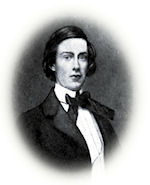October 23.—To-day a battle was fought at West Liberty, Ky., between a part of the Ohio Second, supported by one company of cavalry belonging to the Ohio First, and two pieces of light artillery on the side of the Federals, and seven hundred rebels. The rebels were completely routed, with a loss of twenty-one persons killed, the number of wounded not stated. The Federals captured thirty-four prisoners, fifty-two horses, ten or twelve mules, two jacks, and one large bear, and a great number of guns, knives, and other articles. None killed on the Federal side, and only two wounded—-one of them a flesh wound in the thigh, the other shot on the end of one of his thumbs.
General Nelson, with Colonels Marshall and Metcalfe’s commands, took Hazelgreen, routed two hundred rebels, took thirty-eight prisoners, and established his head-quarters in the house of G. Trimble, one of the leading rebels. There was not a gun fired at that place.
The troops at both places were acting under General Nelson’s orders, the whole belonging to his brigade.—(Doc. 103.)
—When the Union troops were withdrawn from the Virginia side, near Harper’s Ferry, this night, the Sixteenth Indiana, occupying the most advanced and exposed position, were not aware of any withdrawal until the rest had been successfully ferried over. They lay upon the cold ground, almost frozen, with loaded muskets in their hands, every moment expecting a furious and overpowering assault from a concealed and reinforced enemy, whose numbers were known to exceed our own by many thousands; yet the only murmurs uttered by these hardy sons of the Northwest were at the orders to retire without disputing the ground inch by inch with their adversaries. Slowly and mutteringly they retired to the place of embarkation, picking up and loading themselves down with the knapsacks, canteens, guns, and equipments left there by others who had retired before them.—Balt. American, Oct. 30.
—Mr. Charles J. Helm, late United States Consul at Havana, arrived there in the British steamer from St. Thomas, with credentials from the Confederate Government, naming him consul for the Southern Confederation. He presented his papers, asking to be admitted as Consul, but the Captain-General would not do any thing in the matter beyond reporting the case to the Home Government. Other consuls, though the Madrid Government may not have granted the exequatur, are at once admitted to the free exercise of their office before that formality, but this will not be the case in the present instance.—N. Y. Com. Advertiser, Oct. 30.
—Fifty men of the Sixth Indiana regiment, under Lieutenant Grayson, were attacked on the road near Hodgeville, Kentucky, by about double their number of rebels, whom they repulsed. Three rebels were left on the field dead, and five wounded. Three of the Union men were severely wounded, Lieutenant Grayson being of the number.—(Doc. 104.)
—General Fred. W. Lander was ordered to the command of the brigade recently commanded by Colonel Baker. Only a few hours subsequent to his assumption of the command, and while engaged in a reconnoissance, he received a musket ball in the calf of the leg. It was extracted.—N. Y. Times, Oct. 24.








